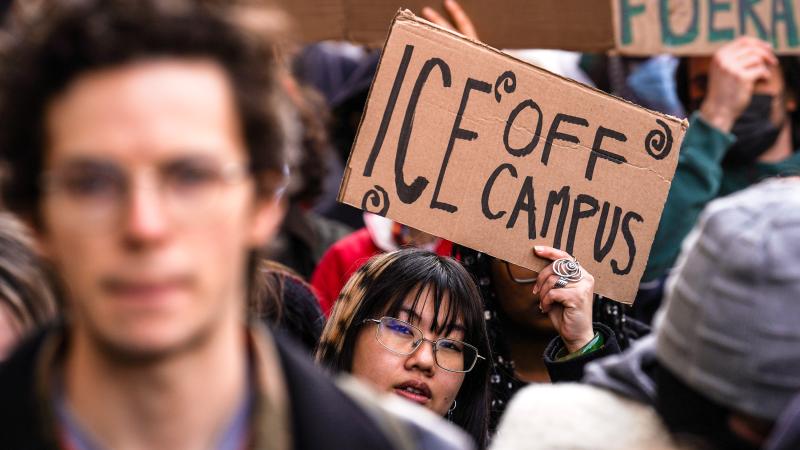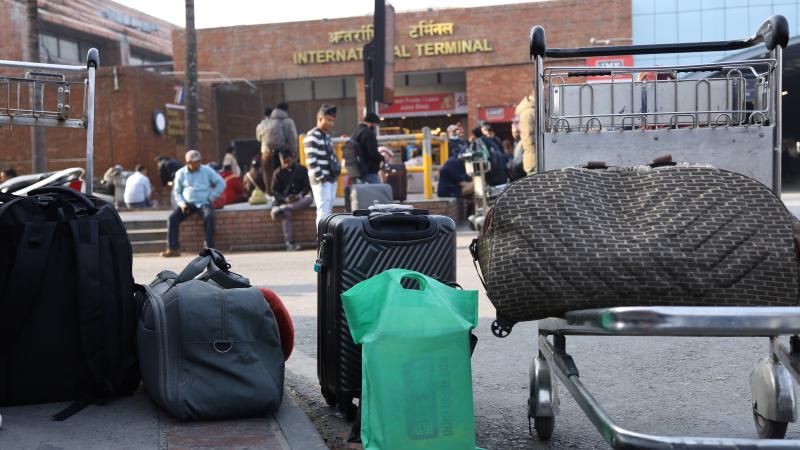Election Day: Eight episodes that awakened parents to liberal indoctrination in schools
School trip to a gay bar, male student in skirt assaults girl in female bathroom, and a student sent to "the black class."
From the marquee Virginia governor's contest to school board contests across America's suburbs, parents of schoolchildren are expected to play an outsized role in Tuesday's off-year election and provide a measurement of just how potent an issue liberal indoctrination in the U.S. education system has become to a restless electorate.
The unexpected rise of the school curriculum movement was sparked by a pandemic that trapped students at home with parents for months, unmasking what was being taught in classrooms and how it was being taught.
Parents suddenly become incensed that their children were being forced to conform to transgender-friendly language or subscribe to the notion the color of their skin was predetermining their future in an inherently racist America. Soon a revolt was waged, with parents confronting their educators and their school boards about such concepts as critical race theory and equity learning.
Along the way, stunning revelations cemented the determination that change was needed, from proclamations that parents don't deserve a say in what is being taught to schoolchildren to disclosures that highly sexualized books involving abortion and pedophilia were being assigned to young students.
"I was able to see into the classroom and see what was being taught and how it was being taught," explains Lysa Kosins, one of three of moms who banded together in a bid Tuesday to oust long-term school board members in the Dayton, Ohio, suburb of Centerville. "And you know, it doesn't work. We need to start treating our kids like individuals, and we need to start allowing the parents who really know what is in the best interest of our children to make choices that better fit their educational needs."
Here are eight defining moments that catapulted the fight against liberal school indoctrination into a nationwide movement that has sparked more than 80 school board recall elections this year.
- A Washington suburb's push for equity learning and gender neutrality ignites a protest.
The wealthy enclave in Loudoun County, Va., became ground zero for the parents' rights movement this past spring, as its school board pushed through equity learning and gender neutrality provisions over objections from parents who don't believe that students must be guaranteed equal outcomes or that teachers or students who don't comply with the gender identification wishes of transgender students should be punished.
- A coverup of skirt-wearing male student's sexual assault on a girl in a female bathroom.
Already in the midst of an intense parent revolt, Loudoun County emerged anew to the forefront of the debate this fall with revelations a biological male student wearing a skirt committed a sexual assault on high school girls in the female bathroom. The offender has been convicted of committing two unwanted sex acts on one girl and faces charges of a sex assault on another girl at a different school. Students have now launched their own protests over what they saw as a coverup.
- The election in Southlake, Texas, affirms parents have the electoral muscle.
A parents-led movement in the affluent community of Southlake became the national proof of concept in May, when candidates who renounced their school district's racial equity curriculum won every race by wide margins, including two school board seats, two city council seats and the mayor's office. Since then, more than 80 school board recall elections have been launched targeting more than 200 officeholders, more than triple a normal election year's tally, according to Ballotpedia.
- Terry McAuliffe and the debate line heard around the country.
In Virginia's closely watched gubernatorial race, Republican outsider Glenn Youngkin was already tapping into the suburban parents' angst over ideologically-infused education when his Democrat opponent, Terry McAuliffe, uttered an unforgettable line in their final debate, transforming the race. "I'm not going to let parents come into schools and actually take books out and make their own decision," McAuliffe declared. "... I don't think parents should be telling schools what they should teach." Almost instantly, the race changed in the reliably blue state to a dead heat in a political bellwether that swept across the country.
- Attorney General Merrick Garland unleashes the FBI on parent protests.
No single event had more impact in transforming the predominantly local debate over school curricula to a federal issue than Garland's ill-fated memo asking the FBI to investigate parents' threats against school board members, which was prompted by the National School Boards Association's letter equating parents with domestic terrorists. The association had to apologize, and Garland has spent weeks trying to explain his edict to distrustful members of Congress. The reverberations were still being felt Monday, when Sen. Chuck Grassley (R-Iowa) renewed his request to have Garland retract his memo. "Mr. Attorney General, parents are not domestic terrorists, and you have only one reasonable choice," Grassley said from the Senate floor. "Withdraw your memo and focus on the real threats. Stop being a pawn for the White House by politicizing the Department of Justice."
- Teachers in one Missouri school district fight back against training they deemed racist.
A group of teachers in Springfield, Mo., opened a new front in the school curriculum battle when they filed suit saying they were subjected to illegal and discriminatory training videos centered around Critical Race Theory. Their suit accused the school district of violating their First Amendment rights by requiring them to take Critical Race Theory training, which included telling the employees to vote for socialist candidates
- 'That's not the black class.' An Atlanta mom stands up to racial segregation of classrooms.
Kila Posey made national waves when she and her husband filed a complaint with the U.S. Department of Education's Office for Civil Rights over the local elementary school principal's segregation of classrooms, a submission that included recordings of their conversations with administrators. Posey alleged that when she tried to pick the classroom that was best for her daughter, who is black, her principal proclaimed, "That's not the black class." Their case prompted other complaints, including a lawsuit this month alleging similar racial segregation in a Massachusetts school district.
- A class trip to a gay bar ignites disbelief.
When a Florida elementary school class in Broward County recently took its students to a gay bar and grill, there was bipartisan outrage over the choice of the venue. Some believed it was an effort by educators to introduce students to a gay lifestyle, while others found it inappropriate for kids to be in a drinking establishment.
The Facts Inside Our Reporter's Notebook
Links
- became ground zero for the parentsâ rights movement
- commit sexual assaults
- offender has been convicted
- student have now launched their own protests
- national proof of concept
- more than 80 school board recall elections
- McAuliffe declared
- Garlandâs ill-fated memo
- association had to apologize
- explain his edict to distrustful members
- Sen. Chuck Grassley, R-Iowa, renewed his request
- filed suit saying they were subjected to illegal and discriminatory training videos
- Kila Posey made national waves
- lawsuit this month alleging similar racial segregation in a Massachusetts school district.
- took its students to a gay bar and grill
















